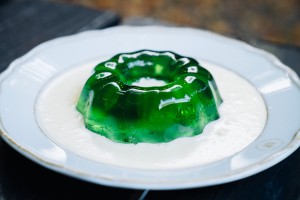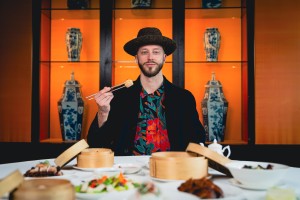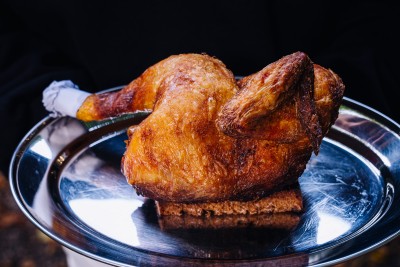You may have heard the whispers about the grand reopening of Clärchens Ballhaus, the iconic Berlin dance hall that has survived two world wars, political upheavals, and enough funky dance moves to make Fred Astaire look like an amateur. Well, last week I ventured in to see if its latest incarnation, Luna D'Oro, is more than just a nostalgic trip to the 1920s. Spoiler alert: it is. But also, it isn’t.
Let’s begin with a bit of background for those who missed the memo: Clärchens Ballhaus has been commandeered and owned by Yoram Roth, the brain behind Fotografiska Museum and its restaurant Veronika, the publications Tip Berlin and The Berliner, among other things. The new iteration of Clärcherns is not just a restoration project; it's a vision. For the last years, renowned caterer Berlin Cuisine had been steering the ship in the kitchen—solid, if unspectacular—but now, with the relaunch, Roth has taken things up several notches by transforming the entire ground floor into Luna D’Oro, a restaurant as dominated by Clärchens’ iconic disco ball as it is by culinary ambition. Enter Tobias Beck. If the name doesn’t ring any bells, it should. Beck’s culinary lineage boasts the likes of his open fire kitchen Ember, but also include stints at international heavyweights in the likes of Ernst, Frantzén and Francis Mallman. This man has credentials, and together with Paul Gerber, the former head chef of Ember, he’s tasked with delivering his unique take on a German restaurant through the lens of Berlin’s roaring ‘20s. The real challenge? Melding the brazen culinary clichés of German cuisine with something that feels fresh and daring. But does he pull it off?

The Setting: A Trip Through Time
Before we even get to the food, let’s talk about the atmosphere. Luna D’Oro oozes 1920s glamour in the likes of the acclaimed tv show Berlin Babylon. The red velvet booths, the gilded lamps, the ancient floors—they all evoke that elusive Berlin elegance of a bygone era. The disco ball sparkles ominously overhead, casting a dreamlike haze that feels nostalgic and contemporary at the same time. You half expect Marlene Dietrich to appear in a cloud of cigarette smoke. This isn’t just a restaurant—it’s a stage, (most of the furniture are in fact movie props) and you’re the extra in its well-rehearsed theatre of decadence. And yet, it’s grounded by something more proletarian: the ballroom dancefloor, once the heartbeat of Clärchens, is now filled with diners who have traded dancing shoes for cutlery. But don’t despair, the upstairs Spiegelsaal is still open for a round of good, old-fashioned tango.

The Food: Ugly Delicious or Just Ugly?
Beck is obsessed with what he calls “ugly delicious” German food. He’s even writing a book about it. If that phrase fills you with dread, don’t worry—you’re not alone. German cuisine, for all its stodgy, comforting charm, often hovers somewhere between utilitarian and aggressively beige. At Luna D’Oro, however, Beck is determined to rehabilitate it into something more—something celebratory, eccentric, and deeply satisfying. But does he succeed? Yes, partially.
We started with Fried Gürkchen with Dill Mayo. It’s exactly what it sounds like—fried pickles. They are, to put it bluntly, absurdly good. Crispy, tangy, and accompanied by a dill mayo so thick you could use it to grout your bathroom tiles. Bravo!
The Tartar-Igel was a bit of a let-down: Anyone familiar with German 80s nostalgia will know the “Mett-Igel”—a pile of raw, minced pork in the absurd form of a hedgehog. Beck’s homage to this culinary oddity is beef tartare moulded into the shape of the same unfortunate mammal. The result? A bit lackluster. The tartare is uninspired, and the egg yolk resting inside doesn’t do much to lift it from mediocrity. It’s not offensive, just slightly forgettable.
“ It’s simple, almost Spartan, but utterly sensational.
Thankfully, redemption is quick. The Königsberger Klopse arrive like a reassuring hug from your Prussian grandmother. Juicy meatballs, smooth mashed potatoes, and a caper sauce that walks the fine line between sharp and indulgent. There’s no fuss here, just clean, classic execution.
Then came the Goldbroiler auf Brot, a showstopper of a dish. A perfectly roasted half-chicken, its skin golden and crisp, rests atop a slice of rye bread that has been artfully soaked in chicken juices. It’s simple, almost Spartan, but utterly sensational. The meat is tender and the bread, now saturated with fat, is an unapologetic treat.
The Kalbsleber “Berliner Art”—veal liver with onions and mustard sauce—was nothing short of a revelation. I’m not a liver enthusiast by any stretch; in fact, it’s one of my least favorite cuts of offal. But Beck’s version, seared to perfection and served with mashed potatoes and apples, was enough to convert me.

The Desserts: Retro Pleasures
Dessert is where Luna D’Or really leans into the 80s throwback vibe. We’re talking Spaghetti Eis — the kitsch German ice cream dish that masquerades as a spaghetti pomodori. It's nostalgic, ridiculous, and somehow delightful. But the real star of the sweet course was the Wodruff Götterspeise, a vivid green jelly made from woodruff, paired with crème anglaise. It’s a dessert you either remember from childhood or didn’t know existed, but either way will taste like pure, unfiltered joy.

Final Thoughts
Luna D’Oro is a restaurant that knows what it’s doing. There’s a knowing wink to its retro kitsch, but also a genuine love for the traditions it’s playing with. Some dishes, like the Tartar-Igel, miss the mark, but others, like the Kalbsleber and Goldbroiler, are sublime. The menu isn’t aiming to blow your mind with creativity—it’s content to scratch an itch for comfort, for nostalgia, for a time when German food was hearty, unfussy, and just plain fun. This is also reflected in the utterly fair pricing, you can eat three courses and drink two glasses of wine for less than 50 EUR.
What really elevates Luna D’Oro is its impeccable atmosphere. The service is top-notch, in fact much more than that, it's close to impeccable, executed by a front-of-house team led by Anh Vu (formerly Oukan), and the whole experience feels like you’ve stumbled into a fantastical Berlin dreamscape.
Whether you’re there for the dancing or the dining, Luna D’Oro is sure to leave you with a grin—and maybe a bit of mustard on your lips.








